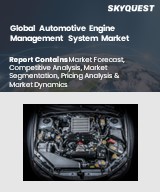
Product ID: SQMIG25A2293

Report ID:
SQMIG25A2293 |
Region:
Global |
Published Date: April, 2024
Pages:
221
|
Tables:
89 |
Figures:
76
Drivers
Increasing Stringent Environmental Regulations Worldwide
Increasing Chronic Evolution of Automobile Era
Restraints
High Upfront Cost Associated with Implementing Advanced Engine Management Technologies
High Interoperability Challenges with Existing Automobile Architectures
Our industry expert will work with you to provide you with customized data in a short amount of time.
REQUEST FREE CUSTOMIZATIONWant to customize this report? This report can be personalized according to your needs. Our analysts and industry experts will work directly with you to understand your requirements and provide you with customized data in a short amount of time. We offer $1000 worth of FREE customization at the time of purchase.

Product ID: SQMIG25A2293